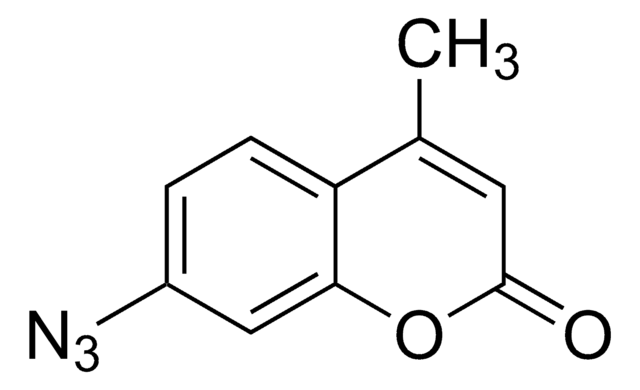C1484
7-Diethylamino-3-(4-maleimidophenyl)-4-methylcoumarin
≥95% purity (HPLC), solid
Synonym(s):
1H-Pyrrole-2,5-dione, 1-(4-(7-(diethylamino)-4-methyl-2-oxo-2H-1-benzopyran-3-yl)phenyl)-, CPM
About This Item
Recommended Products
product name
7-Diethylamino-3-(4-maleimidophenyl)-4-methylcoumarin, ≥95% (HPLC), solid
Quality Level
Assay
≥95% (HPLC)
form
solid
color
yellow
solubility
DMSO: soluble
methanol: soluble
application(s)
diagnostic assay manufacturing
hematology
histology
storage temp.
−20°C
SMILES string
CCN(CC)c1ccc2C(C)=C(C(=O)Oc2c1)c3ccc(cc3)N4C(=O)C=CC4=O
InChI
1S/C24H22N2O4/c1-4-25(5-2)18-10-11-19-15(3)23(24(29)30-20(19)14-18)16-6-8-17(9-7-16)26-21(27)12-13-22(26)28/h6-14H,4-5H2,1-3H3
InChI key
YGIABALXNBVHBX-UHFFFAOYSA-N
Looking for similar products? Visit Product Comparison Guide
General description
Application
- as a nontoxic substitute for conjugation with antibody(93)
- to aid fluorescent detection of Coenzyme A (CoA-SH) in human N-myristoyltransferases assay (94)
- in thermostability shift assay of recombinant protein(95)
Biochem/physiol Actions
Storage Class Code
11 - Combustible Solids
WGK
WGK 3
Flash Point(F)
Not applicable
Flash Point(C)
Not applicable
Personal Protective Equipment
Choose from one of the most recent versions:
Already Own This Product?
Find documentation for the products that you have recently purchased in the Document Library.
Customers Also Viewed
Our team of scientists has experience in all areas of research including Life Science, Material Science, Chemical Synthesis, Chromatography, Analytical and many others.
Contact Technical Service

![N-[2-(Dansylamino)ethyl]maleimide BioReagent, suitable for fluorescence, ≥99.0% (HPLC)](/deepweb/assets/sigmaaldrich/product/structures/318/294/efefa674-7883-4fc7-ad57-ea90ff85069a/640/efefa674-7883-4fc7-ad57-ea90ff85069a.png)











